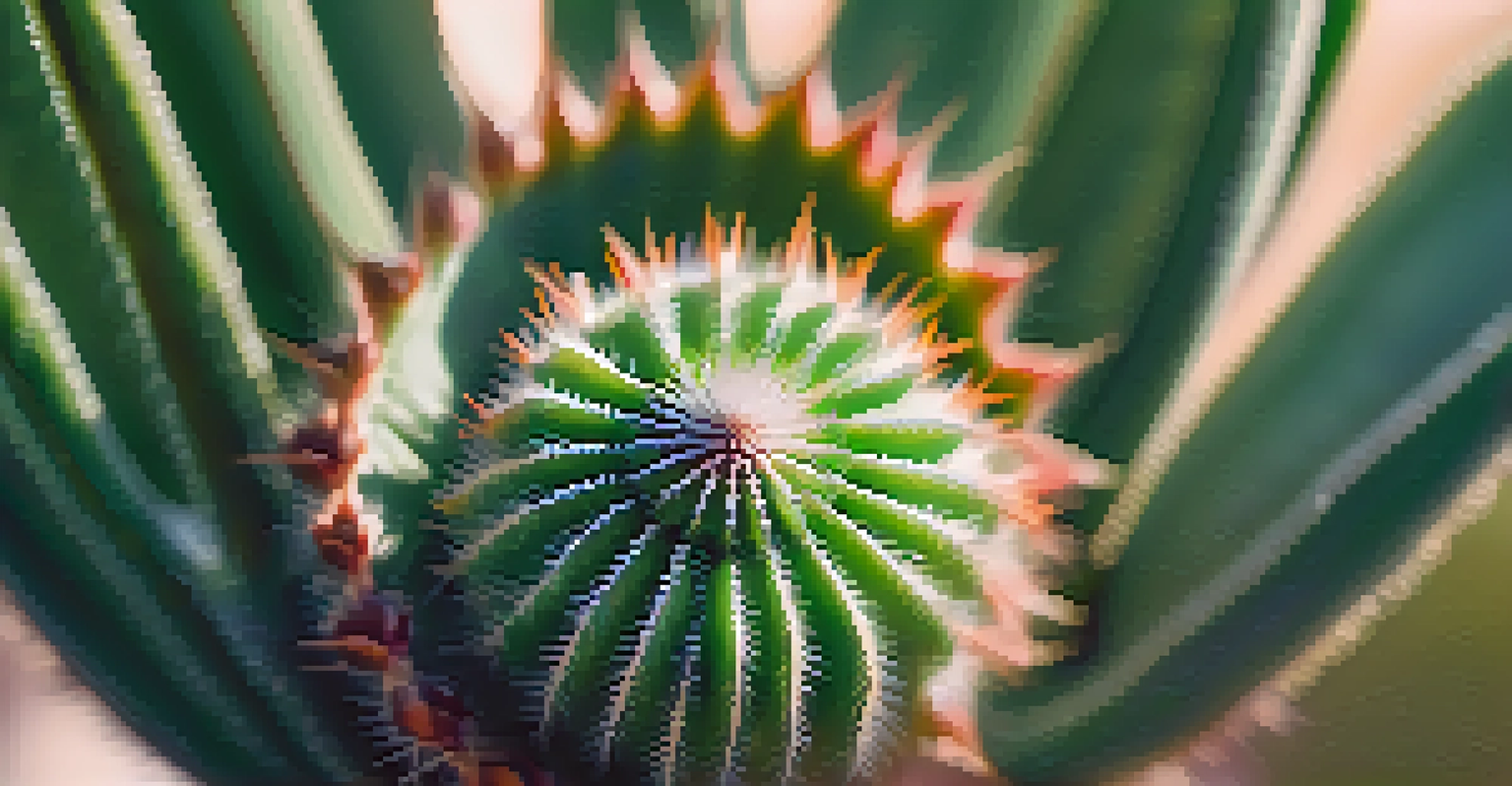Peyote, PTSD, and Emotional Distress: A Closer Look

Understanding Peyote and Its Historical Use
Peyote is a small cactus, primarily found in Mexico and the southwestern United States, known for its psychoactive properties. Traditionally, indigenous cultures have used peyote in religious ceremonies and healing practices for centuries. This sacred plant contains mescaline, a compound that can induce altered states of consciousness, often leading to profound introspection.
The use of psychedelics, such as peyote, has the potential to lead to profound personal insights and emotional healing.
The historical context of peyote use highlights its significance beyond mere recreation; it's seen as a tool for spiritual and emotional healing. This long-standing relationship with the plant piques interest in its potential therapeutic applications, particularly for those struggling with mental health issues such as PTSD.
As we explore the intersection of peyote and PTSD, it's crucial to recognize the cultural lens through which peyote is viewed. Understanding this context can help demystify its effects and offer insights into its potential benefits for emotional distress.
What is PTSD and Its Emotional Toll?
Post-Traumatic Stress Disorder (PTSD) is a mental health condition triggered by experiencing or witnessing a traumatic event. Symptoms include flashbacks, severe anxiety, and uncontrollable thoughts about the event, which can significantly impact daily life. For many, the emotional toll of PTSD can feel overwhelming, isolating them from family, friends, and their own sense of self.

PTSD doesn't discriminate; it can affect anyone, from veterans returning from combat to survivors of natural disasters or personal tragedies. The emotional distress caused by PTSD can lead to feelings of hopelessness and despair, further complicating recovery efforts. This is why effective treatment options are crucial for those affected.
Psychedelics and PTSD Healing
Emerging research suggests that peyote may help alleviate PTSD symptoms through introspective experiences and emotional release.
Understanding PTSD as a complex emotional struggle rather than just a set of symptoms helps to foster empathy and awareness. It emphasizes the need for comprehensive approaches to healing, which is where alternative therapies, like those involving peyote, come into play.
How Peyote Might Help Alleviate PTSD Symptoms
Emerging research suggests that peyote, particularly due to its active compound mescaline, may assist in alleviating some PTSD symptoms. Users often report experiencing deep emotional release and heightened self-awareness during peyote experiences. This introspection can facilitate processing traumatic memories, allowing individuals to confront and reframe their experiences in a supportive environment.
The journey of healing is not linear, and sometimes we need to explore unconventional paths to find our way back to peace.
Moreover, the psychedelic experience can induce a sense of connection to oneself and the world, which may reduce feelings of isolation commonly felt by those with PTSD. The potential for peyote to evoke feelings of peace and acceptance can help individuals navigate their emotional distress more effectively.
While more research is needed to fully understand the implications of peyote use for PTSD treatment, preliminary findings are promising. As we delve deeper into its effects, it opens up new avenues for exploring alternative therapies in mental health.
The Science Behind Peyote and Mental Health
Scientific studies on peyote and its effects on mental health are still in their infancy, but they are gradually gaining traction. Research has shown that psychedelics like mescaline can promote neuroplasticity, allowing the brain to form new connections and pathways. This can be particularly beneficial in breaking the cycles of negative thought patterns often seen in PTSD.
Additionally, some studies suggest that psychedelics can enhance emotional processing, which might help individuals confront and integrate their traumatic experiences. This therapeutic potential is what has drawn the attention of mental health professionals and researchers alike, eager to explore innovative solutions for emotional distress.
Cultural Context Matters
Understanding the cultural significance of peyote use is crucial for appreciating its potential therapeutic benefits.
As we continue to investigate the science behind peyote, it’s important to approach these findings with an open mind, while also considering the cultural significance and historical context of its use. This balanced perspective can enrich our understanding of how peyote might play a role in healing.
Challenges and Considerations in Peyote Use
Despite the potential benefits of peyote for PTSD, there are challenges and considerations to keep in mind. First and foremost, the legality of peyote varies widely across regions, which can complicate access for those seeking its therapeutic effects. Additionally, not all individuals may respond positively to peyote, as the psychedelic experience can be intense and sometimes overwhelming.
It's also critical to consider the setting in which peyote is consumed. A supportive environment, often facilitated by trained guides or therapists, can make a significant difference in the experience. Without proper guidance, individuals may struggle to integrate their experiences in a healthy way, potentially leading to further emotional distress.
This highlights the importance of approaching peyote as part of a broader therapeutic strategy rather than a standalone solution. Combining the use of peyote with other therapeutic practices can create a more holistic approach to healing.
The Role of Guided Experiences with Peyote
Guided experiences are critical when using peyote for therapeutic purposes, as they provide a structured and safe environment. Trained facilitators can help individuals navigate the emotional landscape that arises during a peyote experience, ensuring that they feel supported throughout the journey. This guidance can be invaluable in helping individuals process their feelings and insights effectively.
Moreover, facilitators can assist with integration after the experience, helping individuals apply their insights to everyday life. This post-experience support can be a crucial element in making lasting changes and overcoming the challenges posed by PTSD. It underscores the importance of community and connection in the healing process.
Importance of Guided Experiences
Guided experiences with trained facilitators can enhance the therapeutic effects of peyote, ensuring a supportive environment for healing.
The concept of guided experiences brings us back to the cultural roots of peyote use, where community and shared experiences play a significant role in healing. Emphasizing this communal aspect can foster a sense of belonging, which is often lacking for those affected by PTSD.
Personal Stories and Anecdotes on Peyote Healing
Personal stories from individuals who have used peyote in healing contexts provide powerful insights into its potential benefits. Many report transformative experiences that have helped them confront their trauma and find a renewed sense of purpose. These anecdotes often highlight the deep emotional release and clarity that can arise during a peyote journey.
For instance, a veteran might share how a peyote experience allowed them to process their combat experiences in a way that traditional therapies had not. By confronting these memories in a supportive setting, they found a path toward healing that had previously felt unattainable. Such accounts illustrate the profound impact that peyote can have when combined with the right guidance and support.

These personal narratives not only validate the potential of peyote but also encourage others to explore alternative healing methods. They remind us that healing is a deeply personal journey and that different paths can lead to understanding and recovery.